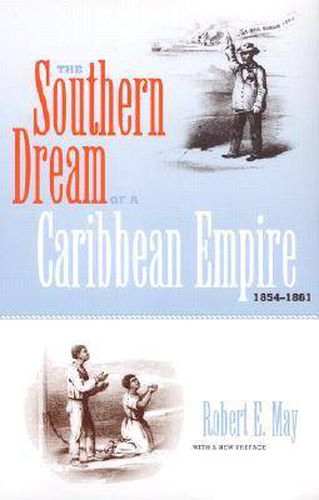Readings Newsletter
Become a Readings Member to make your shopping experience even easier.
Sign in or sign up for free!
You’re not far away from qualifying for FREE standard shipping within Australia
You’ve qualified for FREE standard shipping within Australia
The cart is loading…






A path-breaking work when first published in 1973, The Southern Dream remains the standard work on attempts by the South to spread American slavery into the tropics - Cuba, Mexico, and Central America in particular - before the Civil War. Robert May shows that the South’s expansionists had no more success than when they tried to extend slavery westward. As one after another of their plots failed, southern imperialists lost hope that their labor system might survive in the Union. Blaming northern Democrats and antislavery Republicans alike for their disappointed dreams, alienated southerners embraced secession as an alternative means to achieving a tropical slave empire. Had war not erupted at Fort Sumter, Confederates might have attempted to conquer the Caribbean basin. May’s book serves as an important reminder that foreign policy cannot be divorced from the writing of American history, even in regard to seemingly domestic matters like the causes of the Civil War. Contending that America’s Manifest Destiny became
sectionalized
in the 1850s, he explains why southerners considered Caribbean expansion so important and shows how southerners used their clout in Washington to initiate diplomatic schemes like the notorious Ostend Manifesto and presidential attempts to buy the slaveholding island of Cuba from Spain. He also relates how Caribbean plots affected American public opinion and ignited sectional friction in congressional debates. May argues that President-elect Abraham Lincoln might have saved the Union in the winter of 1860-61, had he agreed to last minute concessions facilitating slavery’s future expansion towards the tropics.
$9.00 standard shipping within Australia
FREE standard shipping within Australia for orders over $100.00
Express & International shipping calculated at checkout
A path-breaking work when first published in 1973, The Southern Dream remains the standard work on attempts by the South to spread American slavery into the tropics - Cuba, Mexico, and Central America in particular - before the Civil War. Robert May shows that the South’s expansionists had no more success than when they tried to extend slavery westward. As one after another of their plots failed, southern imperialists lost hope that their labor system might survive in the Union. Blaming northern Democrats and antislavery Republicans alike for their disappointed dreams, alienated southerners embraced secession as an alternative means to achieving a tropical slave empire. Had war not erupted at Fort Sumter, Confederates might have attempted to conquer the Caribbean basin. May’s book serves as an important reminder that foreign policy cannot be divorced from the writing of American history, even in regard to seemingly domestic matters like the causes of the Civil War. Contending that America’s Manifest Destiny became
sectionalized
in the 1850s, he explains why southerners considered Caribbean expansion so important and shows how southerners used their clout in Washington to initiate diplomatic schemes like the notorious Ostend Manifesto and presidential attempts to buy the slaveholding island of Cuba from Spain. He also relates how Caribbean plots affected American public opinion and ignited sectional friction in congressional debates. May argues that President-elect Abraham Lincoln might have saved the Union in the winter of 1860-61, had he agreed to last minute concessions facilitating slavery’s future expansion towards the tropics.